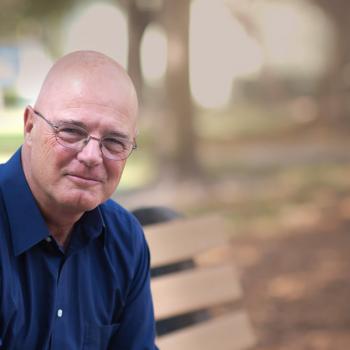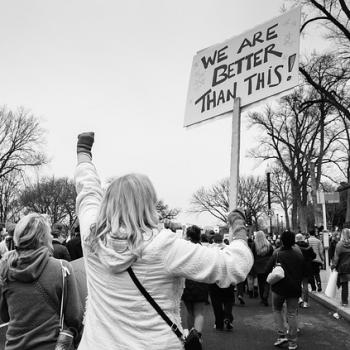The Al-Shabaab terrorists who slaughtered over 60 fellow human beings in Nairobi’s Westgate Mall tried to spare their fellow Muslims through a kind of religious quiz. If you could answer certain religious questions – who was the prophet’s mother, can you recite a verse from the Quran, can you say the Shahada – you were set free. If not, you were murdered.
They were responding to “advice” from the late Osama bin Ladin in a 2010 letter to Al-Shabaab, when he urged them “to minimize the toll to Muslims.” Al-Shabaab leaders explained to the AP, “The Mujahideen carried out a meticulous vetting process at the mall and have taken every possible precaution to separate the Muslims from the Kuffar before carrying out their attack.”
Jews, Hindus, Christians, secular people? Obviously, to the terrorists they were “kuffar,” and fell outside the “meticulous vetting process” that could qualify them as human beings with human rights, including the right to life.
Kristen Powers, in a recent Daily Beast article, observes:
Christians in the Middle East and Africa are being slaughtered, tortured, raped, kidnapped, beheaded, and forced to flee the birthplace of Christianity. One would think this horror might be consuming the pulpits and pews of American churches. Not so. The silence has been nearly deafening.
I’ve noticed the same silence. The fact of widespread persecution of Christians – most often by Muslim extremists – deserves two obvious lines of response. The more difficult and important response is appropriate action. But before wise and effective action can be planned and taken, there must be understanding of the problem, which requires us to ask the question why?
The why question itself takes us in two different, but related, directions:
Why is this kind of anti-Christian persecution happening?
And why is the world, and especially the Christian world, so silent about it?
On that latter question, I am sure there are many more reasons, but let me offer six, speaking as a Christian who cares but has not spoken up often enough or effectively enough about the persecution of Christians in the Middle East:
1. Many Christians are too silent on the issue because they don’t want to add their voices to the growing numbers of Islamophobic voices in the Christian community. When their fellow Christians gin up antagonism towards Muslims in general and Islam as a whole by emphasizing violent acts by extremists, thoughtful, peace-loving Christians – rightly and wisely – don’t want to be part of that. But wrongly and unwisely – many simply remain silent. In so doing, they aid and abet extremism in both Christian and Muslim communities. As Powers stated, quoting Bonhoeffer, “Silence in the face of evil is itself evil.”
2. Some Christians are too silent on the issue because they already know that much anti-Christian violence is retaliation against hawkish American foreign policy. They know that this hawkish policy has brought suffering and death to large numbers of innocent Muslim children, women, and men (and Christians and others as well). They know that invasion and occupation, the use of torture, the ongoing Guantanamo situation, drone strikes, and other elements of US foreign policy have been identified with “the Christian West,” and they know that Christians around the world have suffered as a result. Many American Christians are torn because on the one hand, they support this hawkish foreign policy and don’t want to undermine it, and on the other hand, they sincerely lament the unintended consequences it has set in motion. So, they regret how Christians in Muslim-majority countries have become “collateral damage” of American foreign policy but rather than acknowledge this sad fact, many American Christians remain silent denial about it.
3. Many Christians know that a careless bias against Palestinians – many of whom, by the way, are committed Christians – has become a pre-requisite in some circles for being considered “pro-Israel.” Because of their sincere, unqualified, unlimited, and absolute support for Israel, many don’t want to draw attention to the ongoing occupation of Palestine and its discontents, even though the occupation stirs anti-West/anti-Christian fury which results in suffering for Christians across the Middle East. So, without protest, they let the occupation continue while illegal settlements expand day after day, year after year, even though it means endangering Christians in many Muslim-majority countries – not to mention Palestinians … and really, Israelis, too. On a subconscious, unspoken level, some may have concluded that the suffering of Christians across the Middle East is a price that must be paid to give Israel the support she deserves and needs.This conclusion is seldom spoken aloud.
4. American Christians – myself included – are part of a global oil-based economy, and as such, we are like addicts who depend on repressive Muslim governments for our carbon fix. We pay for cheap gas with the invisible tax of silence and inaction about repressive Muslim regimes. We thus save money, but at great cost to the moral integrity of our souls.
5. Many of us have accepted superficial cliches (“They are evil” or “Their religion is evil”) and avoided the hard, often unsettling work of understanding how religious identity can be turned to violent ends – in any religion: Muslim, Christian, Jewish, Hindu, even atheist. In other words, to avoid facing the plank or splinter in “our” eye, we have stopped talking about the plank or splinter in “their” eye too. By smacking the label “evil” on people and groups, we have exempted ourselves from any further thought, any further need to try to understand a complex situation that defies simplistic “good-guy/bad-guy” categories. We have experienced paralysis as a result of this superficial analysis.
6. We don’t know what can be done practically, so we remain silent.
Each of these reasons for silence, I believe, is indefensible. But they begin to help clarify what must be grappled with if we want to take a step beyond expressing outrage to actually doing something constructive for all who suffer due to religious bigotry. (If people would like to add their constructive and civil suggestions, I hope they’ll do so over at my Facebook page.)
What might something constructive look like? (Part 2 will explore possibilities.)











